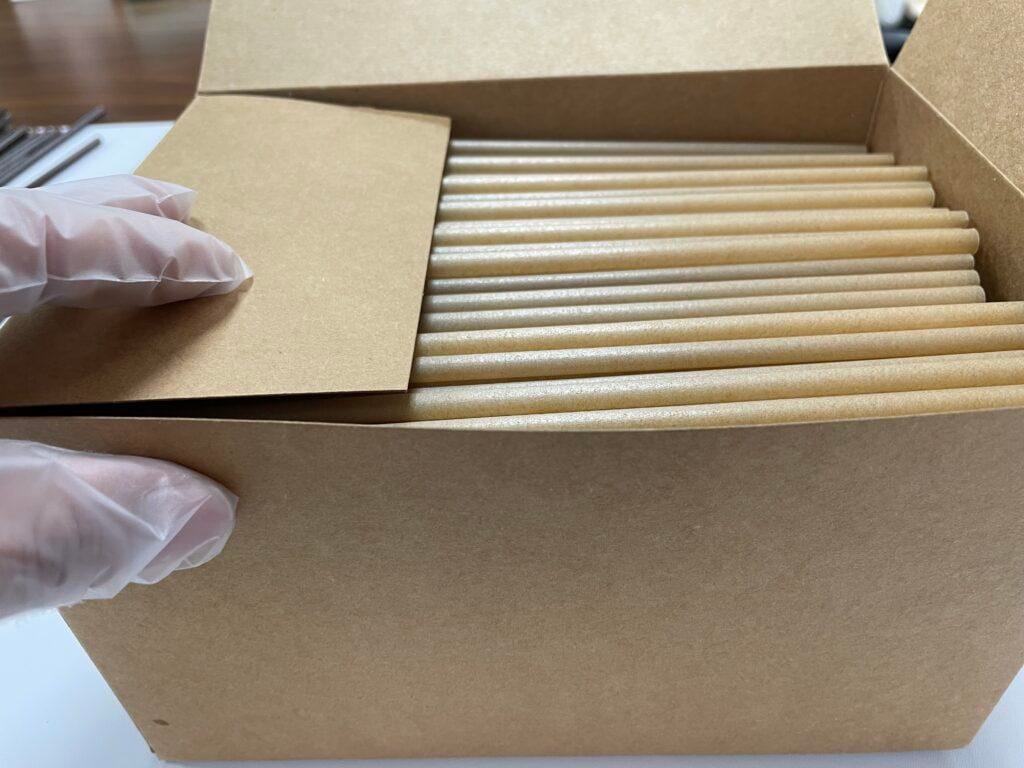
Disposable plastics are one of the biggest contributors to current global plastic pollution. They cannot be completely degraded, and even after hundreds of years, they only break down into small plastic fragments. These fragments either pollute our groundwater or float in the ocean where they are swallowed by marine life and get back into the human body, with significant health effects. If you’ve been looking for an environmentally friendly alternative, sugarcane straws are a great choice.
As a supplier with years of experience in sugarcane straws, Momoio knows a lot about alternatives to plastic straws. because we have done research on them. So here, would like to take a look at sugarcane straws – what they are, how they are used, their advantages and disadvantages.
What are Sugarcane straws?

Sugarcane straws are straws made from sugarcane pulp along with other plant fibers. They do not contain polylactide and can be used in commercial composting and home composting. Sugarcane straws are no different from plastic straws in terms of experience and can be used for cold or hot beverages. We have done experiments and it can be kept under hot water at 80 degrees for 30 minutes without becoming soft. This is obviously better than PLA straws, paper straws. Sugar cane fibers are waste, so reusing them as straws allows you to use what would otherwise go to waste. Once you’re done with the straw, you just throw it away or toss it on your compost pile. Very eco-friendly and not harmful to the environment. There’s no guilt in using them, and Sugarcane straws are one of the best alternatives to plastic straws I’ve ever seen.
What’s The Sugarcane Pros And Cons?

Pros Of Sugarcane Straws
- They’re cheap
- Unlike metal, glass, and bamboo straws, bagasse straws are quite affordable. They cost only slightly more than paper straws, which is a great price. You can purchase packs of 10, 20, or 30 straws for just a few dollars.
- Unlike metal, glass, and bamboo straws, bagasse straws are quite affordable. They cost only slightly more than paper straws, which is a great price. You can purchase packs of 10, 20, or 30 straws for just a few dollars.
- Won’t get soggy
- Our sugarcane straws can be used in cold or hot beverages. They don’t get soft and soggy like paper straws.
- Our sugarcane straws can be used in cold or hot beverages. They don’t get soft and soggy like paper straws.
- You can just throw them away
- There’s no denying that there are some convenience benefits to using and throwing away products. It’s nice to know that once you’re done with a straw, you can throw it in the trash without any regrets. Our straws will slowly disintegrate and won’t harm any animals.
- There’s no denying that there are some convenience benefits to using and throwing away products. It’s nice to know that once you’re done with a straw, you can throw it in the trash without any regrets. Our straws will slowly disintegrate and won’t harm any animals.
- You don’t need to wash them
- Unlike reusable straws, you don’t have to worry about cleaning them. As mentioned before, you can throw them away. There’s no need to take home wet straws in a wet bag, no need to clean them in a restaurant bathroom with a little straw cleaner, and no need to worry about not cleaning them enough for next time.
- Unlike reusable straws, you don’t have to worry about cleaning them. As mentioned before, you can throw them away. There’s no need to take home wet straws in a wet bag, no need to clean them in a restaurant bathroom with a little straw cleaner, and no need to worry about not cleaning them enough for next time.
- They don’t harm the environment
- Bagasse straws use mostly natural products, so they are sustainable and don’t have a huge impact. Throw them in the garbage and they will be sent to a landfill where they will decay after a while. There is no harm to our groundwater or marine life.
Cons Of Sugarcane Straws
None.

To protect our home, please use one less plastic straw and one more bagasse straw.
If you would like an updated inquiry, free samples or more detailed product information, please contact 1@momoio.com Contact: Ching Chiang






